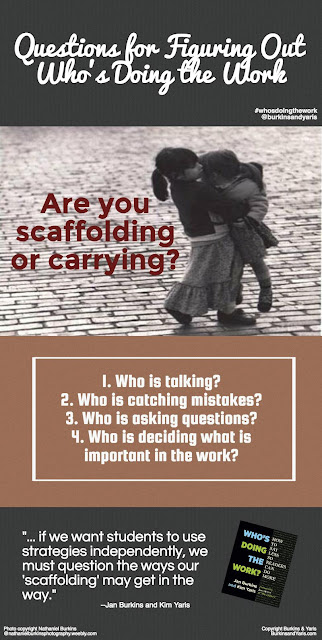After perusing the Twitter feed connected with the image, I quickly became hooked on the content Jan Burkins and Kim Yaris share regarding something known as *Next Generation Reading Instruction*. I realized these talented ladies are authors of various books, including Who's Doing the Work? How to Say Less So Readers Can Do More. I purchased a copy straightaway via Amazon and was on pins and needles waiting for my book to arrive in the mail! During the waiting period, I had sneak-peeks of the book's content via tweets from my PLN. #ilovemyPLN
- Who is talking?
- Who is catching mistakes?
- Who is asking questions?
- Who is deciding what is important in the work?
For this post, I simply want to highlight some of my favorite quotes/tips from the book to give any teacher who teaches reading to students another perspective on the forthcoming way to instruct students in reading.
- "Provide Scaffolding" has been education's blanket answer to many of the most complex teaching and learning situations (p.3).
- Similarly, education's current approach to scaffolding readers supports students in ways that eliminate much, if not all, of the decision making for them (p.5).
- ...we too often develop readers who know how to practice isolated strategies- question, infer, synthesize, clarify, and so on- but who aren't reading for the deepest meaning of a text or reading for the love of it (p.7).
- Rather than teach children to preview texts, we take on the introductions. Rather than teach them to wonder and notice, we ask them text-dependent questions. Rather than allow students to truly choose books for themselves, we retain control, confining them to narrow reading-level parameters and placing excessive demands for book logs and written reflection (p.13).
- To grow and develop as readers, children need instruction that mirrors the "end" goal- readers with smoothly operating, balanced reading processes who feel empowered and motivated to take charge of their reading lives (p.24).
- Teaching across the gradual release of responsibility with an emphasis on reading process- versus an emphasis on reading level- will change the way you teach reading forever (p.27).
- Read-aloud is a commercial for learning to read (p.30).
- When children, particularly those who are not reading at grade level, receive little or no shared reading practice, moving up to the next reading level is often too big a leap for them to make because they have no exposure to the texts they are growing into next. This can cause guided reading groups to plateau as students get stuck in a level (p.57-58).
- Shared reading encourages a growth mindset (p.58).
- Shared reading helps children progress faster in guided reading (p.58).
- As much as possible, use think-pair-share to give all students opportunities to think deeply about what they are discovering in the text (p.63).
- Get into the text quickly. Don't spend much time setting it up; let the book do the work. Remember, you want to begin with the end in mind, and no one will introduce the text in independent reading (p.73).
- When selecting a text for guided reading, it is tempting to simply match the text level to the current level of the students in the group, but next generation guided reading instruction is a bit more discerning and takes into consideration the particular needs, interests, and reading processes of the students in the group (p.89).
- Next generation guided reading should look as much like independent reading as possible because on the gradual release of responsibility, guided reading is just one step removed from independent reading (p.91).
- Give children time to solve problems before prompting them. Enough time often feels like too much time (p.99).
For more information, check out the authors' blog. It's filled with amazing insight into next generation reading instruction, including how to *peel your banana differently* in guided reading!
- Next generation guided reading involves less guiding and more responsive following (p.100).
Last but not least, let's hope this is true!!
Thanks for stopping by and have a happy weekend! :)




































I read the book this summer, and I have been trying to let the kids do more problem solving during independent reading conferences. It's so hard for me to let them struggle and do the difficult work.
ReplyDeleteAgreed, Lauren, but if we are willing to try giving up the difficult work, our students will definitely benefit from the struggle. Keep a #growthmindset on this topic, right? That's how I'm going to look at it from now on. Thanks for stopping by to read my post. Love connecting with other educators! :)
DeleteOrdering this book *right *now, awesome post Colleen!
ReplyDeleteThanks, Michelle! You won't be disappointed. By the way, take a peek at the post again. I added one additional tweet at the end which I found "hopeful" while participating in the #G2Great chat many weeks back. It came directly from the author. Fingers crossed! :)
DeleteLoved this post! I need to order the book; definitely things to think about!
ReplyDeleteHi, Ladies! Thanks for stopping by to read my favorite quotes. In my opinion, this book is a MUST OWN, if you teach reading to any age group. ;)
Delete